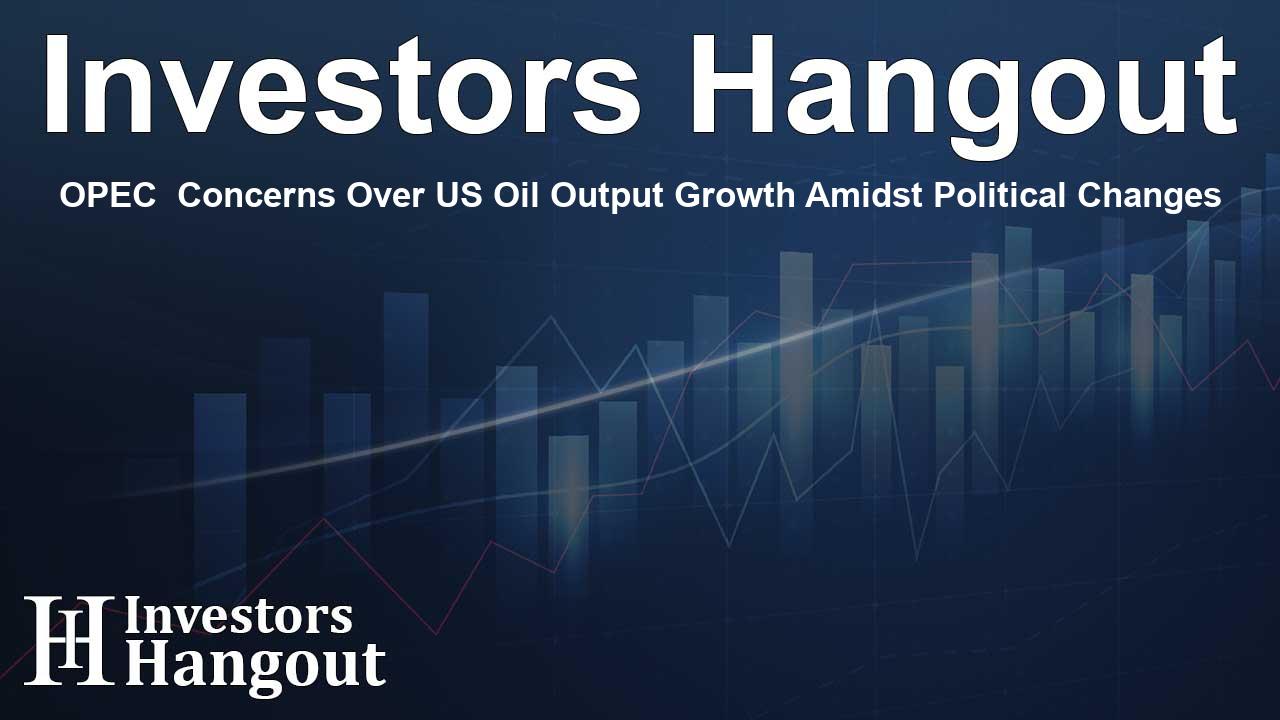OPEC+ Concerns Over US Oil Output Growth Amidst Political Changes

OPEC+ Concerns About US Oil Production Growth
The global oil market is under scrutiny as OPEC+ expresses worries about a renewed increase in U.S. oil output, especially with the prospect of a familiar political figure returning to power. Industry experts highlight how this potential shift could lead to more competition and challenges for OPEC+, which currently plays a significant role in regulating oil supply and stabilizing prices.
Current Dynamics in the Oil Market
As one of the largest oil-producing groups, OPEC+ controls nearly half of the world’s oil supply. Recently, the group decided to postpone production increases until a strategic review in the coming months, primarily due to weak demand alongside robust output from U.S. sources. Supply adjustments are necessary to navigate the complexities of the current oil landscape.
The Influence of U.S. Politics on Oil Production
The political climate in the U.S. influences production capabilities significantly. There are indications that if political leaders shift towards less stringent regulations, U.S. oil production might surge even further. Economic policies being emphasized could lead to increased drilling activity, which would present a challenge for OPEC+ as they strive to stabilize prices through controlled output.
The Challenge of Increased U.S. Production
U.S. oil output has rebounded sharply in the last decade, and some OPEC+ delegates have noted the risks associated with this trend. With the U.S. now producing about a fifth of the world's supply, OPEC+ is cautious about how this could impact their ability to influence oil prices. The potential return to more lenient energy policies could result in a greater volume of U.S. oil flooding the market, which might unwarrantedly lower prices.
The Future of OPEC+ and Its Strategies
OPEC+ is keenly aware that maintaining market share in a competitive environment is crucial. The group has made strategic decisions to keep significant production capacities offline, counters the persistent promise of increased U.S. supply. As per recent data, around 5.85 million barrels per day of production are being withheld as a countermeasure to market fluctuations.
The Implications for Global Oil Supply
OPEC+ anticipates that the ongoing U.S. output increases could lead to diminished overall market influence. The struggles faced by leading oil-producing countries to manage their market shares highlight just how intertwined global energy policies are with political actions in major economies like the United States.
Potential Outcomes for OPEC+ and U.S. Oil Relations
While prospects of increased U.S. oil output raise alarms for OPEC+, some analysts foresee the possibility that these conditions may not lead to immediate production booms. The shale industry in the U.S. emphasizes capital discipline, suggesting that any production increases will hinge on economic viability rather than mere political promises.
Conclusion: Navigating a Complex Landscape
The future of oil production and pricing remains uncertain, shaped by evolving U.S. energy policies and strategic decisions made by OPEC+. As the industry adapts to these developments, the outlook for oil prices will depend significantly on the balance struck between U.S. production ambitions and OPEC+'s cautious management of global oil supplies.
Frequently Asked Questions
What is OPEC+?
OPEC+ is a group consisting of the Organization of the Petroleum Exporting Countries (OPEC) and other oil-producing nations that collaborate to regulate oil supply and maintain price stability in the global market.
How does U.S. oil output affect global prices?
Increases in U.S. oil production can lead to an oversupply in the market, which could result in lower global oil prices, affecting the revenues of OPEC+ countries that depend on higher prices for their economic stability.
What strategies is OPEC+ implementing to manage production?
OPEC+ has implemented supply cuts and is temporarily holding back production to stabilize prices, while assessing market trends and potential shifts in demand due to geopolitical events.
How significant is the political context in shaping oil production?
Political decisions, such as changes in regulations, can greatly influence oil production capabilities and strategies within producer nations, as seen with potential policy shifts in the U.S.
What does the future hold for the oil market?
The oil market is expected to face volatility due to fluctuating demand, geopolitical tensions, and changes in production strategies by both OPEC+ and U.S. producers.
About Investors Hangout
Investors Hangout is a leading online stock forum for financial discussion and learning, offering a wide range of free tools and resources. It draws in traders of all levels, who exchange market knowledge, investigate trading tactics, and keep an eye on industry developments in real time. Featuring financial articles, stock message boards, quotes, charts, company profiles, and live news updates. Through cooperative learning and a wealth of informational resources, it helps users from novices creating their first portfolios to experts honing their techniques. Join Investors Hangout today: https://investorshangout.com/
Disclaimer: The content of this article is solely for general informational purposes only; it does not represent legal, financial, or investment advice. Investors Hangout does not offer financial advice; the author is not a licensed financial advisor. Consult a qualified advisor before making any financial or investment decisions based on this article. The author's interpretation of publicly available data shapes the opinions presented here; as a result, they should not be taken as advice to purchase, sell, or hold any securities mentioned or any other investments. The author does not guarantee the accuracy, completeness, or timeliness of any material, providing it "as is." Information and market conditions may change; past performance is not indicative of future outcomes. If any of the material offered here is inaccurate, please contact us for corrections.